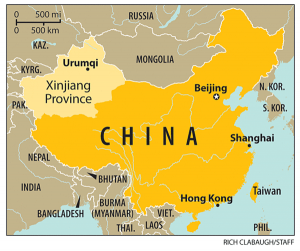Uighurs
About Uighur issue
- The Xinjiang province in China’s far west has had a long history of discord between the authorities and the indigenous ethnic Uighur population.
- Most Uighurs are Muslim, their language is related to Turkish, and they regard themselves as culturally and ethnically close to Central Asian nations.

- Some Uighurs living there refer to the region as East Turkestan and argue that it ought to be independent from China. There have been open calls for separation of Xinjiang from China since the 1990s. Since then, China suppressed any dissent from Uyghur and began placing restrictions on them.
- Ethnic tensions caused by economic and cultural factors are considered the root cause of the recent violence. There are complaints of severe restrictions on Islam, with fewer mosques and strict control over religious schools.
Recent developments
- Rights activists have said the Xinjiang region is home to a vast network of extrajudicial internment camps that have imprisoned at least one million people, which China has defended as vocational training centres to counter extremism.
- Most of the people who have been arbitrarily detained are Uighur. Human rights organizations, UN officials, and many foreign governments are urging China to stop the crackdown.
- But Chinese officials maintain that what they call vocational training centers do not infringe on Uighurs’ human rights. They have refused to share information about the detention centers, and prevented journalists and foreign investigators from examining them.
Why in the News?
- Expressing grave concerns over the “Uighurs genocide” in China’s Xinjiang province, Canada delivered a joint statement on behalf of 42 countries at the UN Humans Rights Council recently, urging China to allow immediate, meaningful and unfettered access to Xinjiang for independent observers.
- The statement was backed by major countries Germany, France, Italy, Japan, Australia, Britain, Spain and the United States, among others.
- The remarks highlighted reports of torture or cruel, inhuman and degrading treatment or punishment, forced sterilization, sexual and gender-based violence, and forced separation of children from their parents by authorities.
About UNHRC
- The Human Rights Council is an inter-governmental body within the United Nations system.
- The Council’s mandate is to promote “universal respect for the protection of all human rights and fundamental freedoms for all” and “address situations of violations of human rights, including gross and systematic violations, and make recommendations thereon.”
- It has the ability to discuss all thematic human rights issues and situations that require its attention throughout the year.
- The Council was created by the United Nations General Assembly in 2006. It replaced the former United Nations Commission on Human Rights.
- The headquarters of UNHRC is in Geneva, Switzerland.
Membership
- The Council is made of 47 Member States, which are elected by the majority of members of the General Assembly of the United Nations through direct and secret ballot.
- The Council’s Membership is based on equitable geographical distribution.
- Members of the Council serve for a period of three years and are not eligible for immediate re-election after serving two consecutive terms.
Reference:
Subscribe
Login
0 Comments
